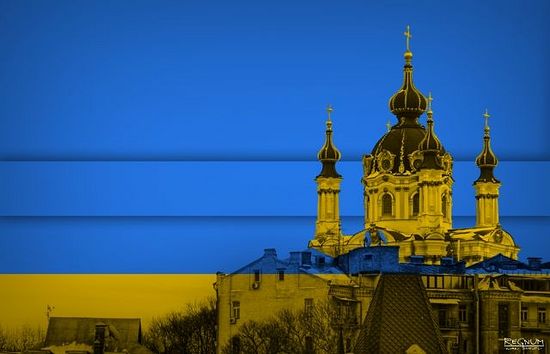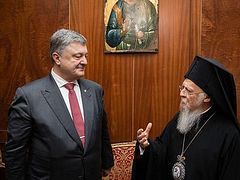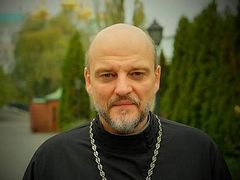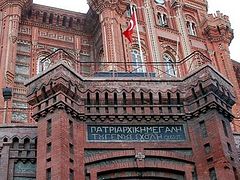In this text, the author, Anna Stickles, refers to Archimandrite Grigorios D. Papathomas, who is one of the leading canonical scholars supporting the Ecumenical Patriarchate in the Ukraine crisis, and whose definition of ethno-phyletism she finds particularly useful in evaluating the Ukrainian situation. He is a Lecturer of Canon Law at the Orthodox Institute of St. Serge in Paris and a Lecturer of Canon Law in the Faculty of Theology, University of Athens.
***
Archimandrite Grigorios D. Papathomas describes ethno-phyletism this way:
“Ethno-phyletism constitutes … a confusion between the Church and the race/nation, an assimilation—and even, sometimes, identification—of the Church with the nation… Phyletism 'tribalizes' the Church and subordinates it to the endo-created historic goals of the race and the nation or, even worse, exploits the Church in order to discriminate against those of other races and nations solely for the benefit of the race and the nation.”1
Now if we look at this in light of the parties involved in Ukraine, we have to ask which party—the canonical Ukrainian Church or Poroshenko along with the schismatic churches—show this heresy? The canonical Church recognizes that there are various political views in the country—those who have a Ukrainian vision of being one race with the Russians, those who have a historical vision in which there have always been two separate nations/peoples, and many variations along the spectrum. The canonical Church does not try to suppress the diversity of these views, but simply supports the territorial integrity of the nation and encourages people to find unity in Christ even in the midst of differing political opinions.
On the other hand, Poroshenko and the schismatics have constantly shown discrimination against those of other races; i.e., those of the Russian language and ethnicity, and they do this under the auspices of benefiting the nation. Does a political “us vs. them” atmosphere full of suspicion and mistrust really build a strong nation or does the effort toward living together in trust and cooperation build a strong society? Poroshenko has slandered his own citizens, making the accusation that anyone who speaks Russian or sympathizes with traditional Russian culture (rather than the Western European culture that Poroshenko supposedly wants to introduce into Ukraine) must necessarily be unpatriotic and want the nation of Ukraine absorbed back into Russia. He is not willing to recognize the distinction between race and nations, or allow that there might be those who speak Russian or are culturally more Russian who also support the integrity of the Ukrainian state and actually be patriotic.
This is not to deny that there are various individuals who may not be patriotic, but this should be determined according to some kind of proof of action, not universally prejudicially applied according to cultural affinity. To drive his views, Poroshenko and those with him preach a political agenda of fear and suspicion. And this is the person that Patriarch Bartholomew has allied himself with.
Archimandrite Grigorios continues:
“The Ecclesiological Heresy first appeared in the heart of the Orthodox Church in 1870, with the arbitrary establishment of the Bulgarian Exarchate in Constantinople, according to which the Church is organized not on a territorial basis, but rather on a racial, national, or—to be more precise—culturalistic one, such that, in a way of co-territoriality, two or more Ecclesial entities and Ecclesiastical jurisdictions can co-exist in the same territory.”
If Constantinople decides to submit to Poroshenko’s wishes and establish an Orthodox church on Ukrainian soil against the wishes of the canonical Church, is this not exactly what will appear? On the same territory there will be two ecclesial entities split according to cultural/political criteria. In America we do not have these kind of ethnic tensions in politics, but an analogy would be setting up one Orthodox church for Democrats and one for Republicans. While some very politically-minded people may joke that this would not be a bad thing, I think we all recognize how very seriously this warps the very nature of what the Church stands for in terms of bringing all into one in Christ. This denies the central Eucharistic mission of the Church.
Let’s take a brief look at the history of the council that condemned ethno-phyletism and the events leading up to it.2 When the Bulgarians and the Ecumenical Patriarch could not work things out, the sultan stepped in and unilaterally intervened. He created a jurisdiction for the Bulgarians that territorially overlapped with the Patriarch’s, and the Patriarch complained that the ecclesial principle of one bishop for one territory was being violated. He also complained that the Turkish government should not be interfering in Church problems. Today, who is playing sultan?
When a council of laymen was convened to elect a Bulgarian bishop, the Ecumenical Patriarch immediately deposed him. Now, however, this same Patriarchate is restoring schismatic, deposed bishops to communion without repentance.
In order to settle this Bulgarian question the Ecumenical Patriarch convoked a general council that same year in 1872, which it decided that ethno-phyletism was a heresy; all the churches have since accepted this council’s decision, even the ones who did not attend. In the current situation the Russian Church has also called for a Pan-Orthodox council to help settle the problem, but Constantinople, who currently has the rights of calling a council, will not respond.
One question is: Will Constantinople continue to simply dismiss anyone whose ideas or plans differ from theirs as spreading fake news? Or will they make the effort to bear all things, believe all things, hope all things, endure all things?3 in reference to their Ukrainian and Russian Orthodox brothers who are being slandered? Will they persist in a mindset that looks with suspicion at those who do not agree with them or will they move to the place where to the pure all things are pure?
Lastly, the question is: Will His All-Holiness Patriarch Bartholomew of Constantinople have the courage to stand up to ethno-pyletism and live according to ecclesial truth, or will he bow to the pressure? He now faces the additional pressure that dropping this whole thing would be to lose a great deal of public face in the eyes of the secular world—although this move would only give him a great deal of credence in the eyes of those with faith, who understand what an act of courage and holiness it is to confess our errors. Genuine metanoia is only seen in holy people, and is not something seen in the secular world. This kind of courage is only attained by grace.





